Programming for the Fall 2017 series has concluded. Please check back for information about the Fall 2018 program.
Past Lectures
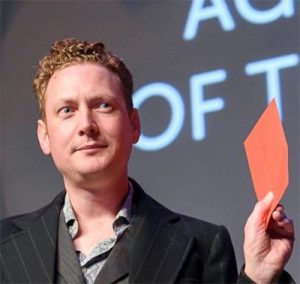 November 28
November 28
Matthew R.X. Dentith
Post-doctoral fellow, Institute for Research in the Humanities
University of Bucharest
“Investigating Conspiracy Theories: The case for treating conspiracy theories seriously, even the (apparently) ridiculous ones”
The term ‘conspiracy theory’ gets a bad rap in public discourse. Recent academic work – particularly in History, Philosophy and Sociology – has convincingly argued that conspiracy theories do not deserve their bad reputation; conspiracies don’t just happen but many pejoratively-labelled ‘conspiracy theories’ have turned out to be warranted. But what would it be like to treat such theories seriously enough to engage in a systemic investigation of them? How do we sort good theories from bad? What counts as evidence for or against a conspiracy? Just who would investigate such theories? Drawing together a swath of recent academic work on these things we call ‘conspiracy theories’ I argue that we ought to treat conspiracy theories seriously and investigate them, even if that means sometimes we have to ponder whether alien shape-shifting reptiles run our governments.
Matthew Dentith is author of Philosophy of Conspiracy Theories, Co-host and producer of the Podcaster’s Guide to the Conspiracy Podcast. Dentith has published numerous papers in such venues as Social Epistemology, Episteme, Skeptic, and The Fortean Times.
November 14, 2017
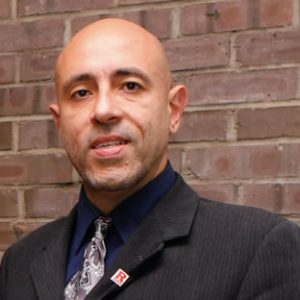 Jack Bratich
Jack Bratich
Associate Professor of Journalism & Media Studies, School of Communication & Media
Rutgers University
“If Everyone is a Conspiracy Theorist, is Anyone? Trumpism, Mutually Assured Disqualification, and Communications Warfare”
The decades-long problematization of conspiracy theories has undergone a sea change in the past year. Since the early 1990s, conspiracy theories have been targeted for ridicule, concern, and repression. News accounts and pundits routinely dismissed and disparaged such thinking as paranoid and/or politically dangerous. State intellectuals like Cass Sunstein called for more direct action (“cognitive infiltration”) against communities that circulated such threatening ideas. This anti-conspiracy theory discourse is something I call conspiracy panics.
Now, however, the US is governed by a president and white house staff that is ambivalently positioned in these conspiracy panics. As part of the lineage of Commanders in Chief that have denounced conspiracy theories (Clinton, Bush, Obama), Donald Trump continues to hurl the category, this time against his mainstream media critics (whom he calls “fake news media”). At the same time, as many pundits have pointed out, the president himself is a conspiracy theorist (as an original Birther, a 9/11skeptic of the WTC towers’ collapse, and supporter of conspiracy media mogul Alex Jones). But in a funhouse reversal, the president is also a conspirator. His knowledge of, if not participation in, Russian collusion, the spread of disinformation (alt facts), and treasonous behavior puts him squarely in the center of a coup-like takeover of the country, according to his critics. Moreover, investigators have uncovered that the white house officials were in cahoots with Fox News and a wealthy funder to concoct and amplify a fake conspiracy theory (about the murder of DNC staffer Seth Rich). In other words, critics formed conspiracy theories about Trump (often laced with Cold War sentiments) while accusing him of being a conspiracy monger.
The label “conspiracy theory” has moved from being a disqualification to a mutually used weapon, perhaps rendering it harmless (mostly). We’re in a new era where conspiracy theorizing (along with anti-conspiracy theorizing) has become mainstream, on both sides of the aisle. Even Lucien Greaves, the head of the Satanic Temple, combats Satanic Panics by indulging in conspiracy panics by highlighting the irrationality of its enemies. I propose that this terrain filled with conspiracy theorizing and conspiracy panics produces at least three results: 1) the disempowerment of revelation. 2) the revival of anti-extremism as an attempt to bolster liberal centrism (which has implications for current responses to antifa); and 3) the prominence of information and communications warfare as model for understanding politics and public culture.
Jack Bratich is author of Conspiracy Panics: Political Rationality and Popular Culture, as well as co-editor of Foucault, Cultural Studies, and Governmentality, (with Cameron McCarthy and Jeremy Packer, 2003). He takes a critical approach to the intersection of popular culture and political culture and studies media culture as an intersection of power, knowledge, and subjectivity.
November 7, 2017 – Atherton Lecture
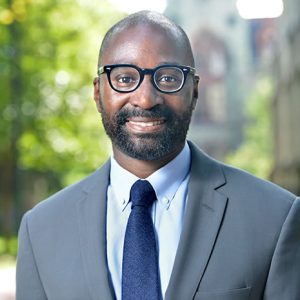 John L. Jackson, Jr.
John L. Jackson, Jr.
Richard Perry University Professor, Dean, School of Social Policy & Practice (SP2)
University of Pennsylvania
“What’s Love Got to Do with It?: Race, Conspiracy Theories, and Contemporary Hip-Hop Culture”
This talk will try to invoke the very logic of conspiratorial thinking to map out some of hip-hop culture’s fascination with conspiracy theories linked to world global domination and racial hatred. It draws from current hip-hop artists and classic anthropological theory to lay out some of this pop-cultural terrain. The lecture will also make a related argument about the complicated role of love (especially a weaponized and self-destructive form of loving) in contemporary popular culture.
Dr. Jackson’s research examines racial and class-based differences in contemporary urban environments, including a focus on how urbanites themselves theorize and deploy those differences in everyday interactions. He is author of several books, including Impolite Conversations: On Race, Class, Sex, Religion, and Politics (co-written with Cora Daniels, 2014), and Thin Description: Ethnography and the African Hebrew Israelites of Jerusalem, 2013. He has also been involved—as producer, director, etc.—in the creation of several films, including Bad Friday: Rastafari After Coral Gardens (2010) and African-Americans and the Bible.
October 24, 2017
 Lilith Mahmud
Lilith Mahmud
Associate Professor of Gender & Sexuality Studies, School of Humanities & Associate Professor of Anthropology, School of Social Sciences
UC Irvine
“Fascists, Communists, and the Masons: Conspiracy Theorizing in the New World Order”
Conspiracy theories are powerful forms of knowledge. Although they are often dismissed, especially in democratic countries, as the paranoid thinking of fringe groups, conspiracies are actually found both at the margins and in the center of political discourse, equally common among the left as the right. In this talk I will examine some specific political conspiracies about the workings of a “new world order.” Drawing on my ethnographic research among Freemasons, one of conspiracy theorists’ favorite subjects, as well as their presumed political nemeses—fascists and communists—, I will extrapolate the recurrent tropes, characters, and genres through which conspiracies build their alternative views of the social world. My aim is to show that conspiratorial knowledge, regardless of its merits in any specific case, ought to be taken seriously as a form of resistance and critique that makes visible the nexus of belief, power, and truth underlying mainstream, dominant knowledge, too.
Lilith Mahmud is a feminist anthropologist whose research has focused on elites, secrecy, power, gender, and the Right. She is author of The Brotherhood of Freemason Sisters: Gender, Secrecy, and Fraternity in Italian Masonic Lodges (U of Chicago Press, 2014), which won the William A. Douglass Prize in Europeanist Anthropology from the Society for the Anthropology of Europe.
Sponsored by the Compton Foundation Visiting Fellows Endowed Fund
October 10, 2017
Joseph Uscinski
Associate Professor of Political Science
University of Miami
“Conspiracy Theories are for Losers”
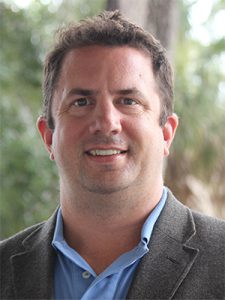 Americans have believed in conspiracy theories since before the United States united. A ceaseless array of conspiracy accusations have demonized witches, Freemasons, foreigners, red coats, black helicopters, Mormons, Muslims, Jews, fifth columns, the government, and more recently, Vladimir Putin. The common assumption is that conspiracy theories are nothing more than the delusions of paranoid minds trying to make sense of an ever more complicated world. However, the evidence tells a different story. In this talk, Professor Uscinski will show that conspiracy theories follow a strategic logic: they are tools used by the powerless to attack and defend against the powerful. Conspiracy theories must conform to this logic, or they will not be successful. In this way, conspiracy theories are for losers.
Americans have believed in conspiracy theories since before the United States united. A ceaseless array of conspiracy accusations have demonized witches, Freemasons, foreigners, red coats, black helicopters, Mormons, Muslims, Jews, fifth columns, the government, and more recently, Vladimir Putin. The common assumption is that conspiracy theories are nothing more than the delusions of paranoid minds trying to make sense of an ever more complicated world. However, the evidence tells a different story. In this talk, Professor Uscinski will show that conspiracy theories follow a strategic logic: they are tools used by the powerless to attack and defend against the powerful. Conspiracy theories must conform to this logic, or they will not be successful. In this way, conspiracy theories are for losers.
Professor Uscinski will highlight his analysis of more than a hundred years of data taken from newspapers, surveys, and the internet. The surprising findings address the following questions: Who believes in conspiracy theories and why? Why are some conspiracy theories more popular than others? What are the dangers of conspiracy theories? Are conspiracy theorists prone to violence? How did conspiracy theories affect the 2016 presidential election and how will they affect the United States going forward?
Joseph Uscinski is associate professor of political science at University of Miami in Coral Gables, Florida and co-author of American Conspiracy Theories (Oxford, 2014).
September 26, 2017
 Lee Basham
Lee Basham
Professor of Philosophy
South Texas College
“Governing by Crisis: How Toxic Truths Subvert Mainstream Investigation”
We live in an information hierarchy where a few control what most believe about important events and the causes of these. The basic institutions of this hierarchy are mainstream media and national law enforcement. Conspiracy theorists often accuse both of covering up extreme government crimes and deceptions; a shadow government controls what they tell us and more importantly, what they don’t. The typical response to this allegation is that these institutions are in the business of reliably revealing political conspiracies, not covering them up. Unfortunately, our best justifications for this hope fail. Worse, cover-up does not require descending control of information by high-placed conspirators. Instead, the problem is built into the foundation forces of our information hierarchy. Some conspiratorial scenarios are too toxic for our institutions of public information to investigate, let alone disseminate. Cover-up by our information hierarchy through intentional neglect of investigation, not descending control by a shadow government, becomes predictable. The danger this poses is extreme.
Lee Basham is a professor of philosophy at South Texas College and the University of Texas, Rio Grande Valley. He is author of a number of professional articles and book chapters on issues surrounding contemporary conspiracy theories.
September 12, 2017
Kathryn Olmsted
Professor of History
UC Davis
 “Just Because You’re Paranoid Doesn’t Mean They’re Not Out to Get You: Anti-Government Conspiracy Theories in American History”
“Just Because You’re Paranoid Doesn’t Mean They’re Not Out to Get You: Anti-Government Conspiracy Theories in American History”
Kathryn Olmsted is author of multiple books on U.S. and California history, including Challenging the Secret Government: The Post-Watergate Investigations of the CIA and FBI (1996), Real Enemies: Conspiracy Theories and American Democracy, World War I to 9/11 (2009), and Right Out of California: The 1930s and the Big Business Roots of Modern Conservatism (2015). Her research develops one of the central themes of 20th-century U.S. history: the influence of anticommunism on American politics and policy.
September 5, 2017
Nick Schou, Managing Editor, OC Weekly
Ben Collins, Senior News Editor at The Daily Beast
“Contemporary and classic conspiracy theories: a journalistic perspective”
Learn about recent conspiracy theories with journalists Nick Schou and Ben Collins.
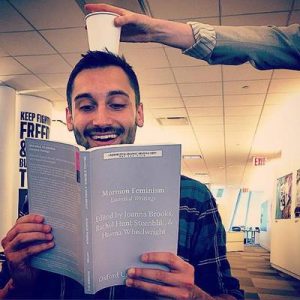 Ben Collins is the co-host of Truther, a weekly podcast from The Daily Beast’s Erin Gloria Ryan, Ben Collins and Gideon Resnick that explores how conspiracies get started as they happen. In addition, Collins regularly covers conspiracy theories as part of his work at the Daily Beast, having covered Alex Jones, Pizza Gate, NASA’s slave colony on Mars, and the widespread belief in “crisis actors.” His work has appeared in The Daily Beast, Esquire, and The Boston Globe, among other places.
Ben Collins is the co-host of Truther, a weekly podcast from The Daily Beast’s Erin Gloria Ryan, Ben Collins and Gideon Resnick that explores how conspiracies get started as they happen. In addition, Collins regularly covers conspiracy theories as part of his work at the Daily Beast, having covered Alex Jones, Pizza Gate, NASA’s slave colony on Mars, and the widespread belief in “crisis actors.” His work has appeared in The Daily Beast, Esquire, and The Boston Globe, among other places.
 Award-winning investigative journalist Nick Schou is managing editor of OC Weekly. He is the author of Kill the Messenger: How the CIA’s Crack Cocaine Controversy Destroyed Journalist Gary Webb (Nation Books 2006), which provided the basis for the 2014 Focus Features release starring Jeremy Renner and the L.A. Times-bestseller Orange Sunshine: The Brotherhood of Eternal Love’s Quest to bring Peace, Love and Acid to the World, (Thomas Dunne 2009). He is also the author of The Weed Runners (2013) and Spooked: How the CIA Manipulates the Media and Hoodwinks Hollywood (2016).
Award-winning investigative journalist Nick Schou is managing editor of OC Weekly. He is the author of Kill the Messenger: How the CIA’s Crack Cocaine Controversy Destroyed Journalist Gary Webb (Nation Books 2006), which provided the basis for the 2014 Focus Features release starring Jeremy Renner and the L.A. Times-bestseller Orange Sunshine: The Brotherhood of Eternal Love’s Quest to bring Peace, Love and Acid to the World, (Thomas Dunne 2009). He is also the author of The Weed Runners (2013) and Spooked: How the CIA Manipulates the Media and Hoodwinks Hollywood (2016).